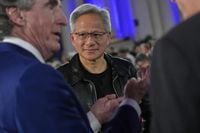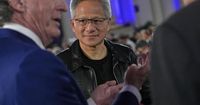On July 31, 2025, China’s cyberspace regulators summoned Nvidia, the world’s leading chipmaker, over serious security concerns related to its H20 artificial intelligence chips. The Cyberspace Administration of China (CAC) demanded that Nvidia provide explanations and submit relevant materials addressing alleged “backdoor safety risks” that could allow the chips to be tracked, located, and remotely disabled. This development comes just two weeks after the Trump administration lifted a ban on the sale of these chips to China, allowing Nvidia to resume its business in the Chinese market.
The CAC’s statement cited unnamed U.S. AI experts who claimed that Nvidia’s H20 chips contain mature technologies capable of tracking and remotely shutting down the devices. Citing Chinese cybersecurity, data security, and personal information protection laws, the agency said it summoned Nvidia to “safeguard the cybersecurity and data security of Chinese users.” The watchdog’s move reflects Beijing’s growing vigilance amid the ongoing tech rivalry between the United States and China, where national security concerns often intersect with commercial interests.
In response, Nvidia firmly denied the allegations. A company spokesperson told the Associated Press, “Cybersecurity is critically important to us. NVIDIA does not have ‘backdoors’ in our chips that would give anyone a remote way to access or control them.” This statement echoes Nvidia CEO Jensen Huang’s recent remarks during his visit to Beijing earlier in July, where he enthusiastically celebrated China’s technological ambitions and named prominent local firms such as Alibaba, DeepSeek, and Tencent.
The H20 chip, designed specifically to comply with U.S. export restrictions, is a toned-down version of Nvidia’s high-end Hopper architecture, which also underpins the more advanced H100 chips. The Trump administration originally blocked the sale of H20 chips in April 2025 over fears that the technology could be used by the Chinese military or for surveillance. However, Washington reversed its stance recently, allowing Nvidia and Advanced Micro Devices (AMD) to resume sales, with the expectation that Nvidia could sell hundreds of thousands more chips in China this year.
Despite the easing of export controls, the move has sparked intense debate and concern in Washington. On July 28, 2025, a group of top Democratic senators, including Senate Minority Leader Chuck Schumer, wrote to Commerce Secretary Howard Lutnick expressing “grave concerns” about lifting the ban. While the H20 chips are less capable than the most advanced H100 models, the senators warned that they still provide China with capabilities that its domestically developed chipsets cannot match.
Rep. John Moolenaar, R.-Michigan, who chairs the House Select Committee on China, also voiced opposition shortly after the ban was lifted. In a letter to Lutnick, he wrote, “The Commerce Department made the right call in banning the H20. Now it must hold the line. We can’t let the CCP use American chips to train AI models that will power its military, censor its people, and undercut American innovation.” The acronym CCP refers to the Chinese Communist Party.
The CAC’s action also appears linked to recent U.S. legislative efforts. In May 2025, Representatives Bill Huizenga (R.-Michigan) and Bill Foster (D.-Illinois) introduced the Chip Security Act, which would require advanced chips exported from the U.S. to be equipped with “security mechanisms” for tracking and detecting smuggling or exploitation. Though the bill has yet to advance in Congress, the CAC’s statement referenced calls from U.S. lawmakers to embed tracking and locating capabilities on chips sold overseas.
Industry analysts see the CAC’s scrutiny as part of China’s broader push for technological self-reliance amid ongoing U.S. export controls. Charlie Dai, a principal analyst at Forrester, noted, “The CAC’s scrutiny could further erode Nvidia’s Chinese market share amid rising domestic competition, and immediate H20 sales resumption may face delays due to regulatory uncertainty.” China’s domestic chipmakers, including Huawei Technologies, are developing homegrown AI chips like the Ascend 910C, which is considered competitive with the H20 for AI inference tasks.
The geopolitical stakes are high, with both the U.S. and China racing to lead in artificial intelligence. Washington has maintained a ban on the most advanced chips necessary for AI development, while allowing limited sales of downgraded models like the H20. Meanwhile, Chinese regulators are tightening their grip on foreign technology, wary of potential security vulnerabilities and espionage risks.
Adding to the complexity, recent reports surfaced of an estimated $1 billion worth of Nvidia AI chips, including models banned by the U.S. such as the B200, H10, and H200, circulating in China’s black market. This underlines the challenges of controlling advanced technology flows amid the global semiconductor supply chain’s intricacies.
Washington’s Commerce Secretary Howard Lutnick had hailed the resumption of H20 sales as a breakthrough achieved through recent trade talks in London, where China agreed to increase sales of rare-earth minerals vital for high-tech manufacturing. However, the CAC’s latest move may signal Beijing’s ambivalence toward the H20 chips, suggesting they might not be as valuable to China’s long-term ambitions as previously thought.
As tensions simmer, Nvidia CEO Jensen Huang was recently photographed with Interior Secretary Doug Burgum before President Donald Trump’s speech at an AI summit in Washington on July 23, 2025, underscoring the high-profile nature of the AI chip industry in U.S.-China relations. The saga of the H20 chips highlights the fragile balance between commercial opportunities and national security in the tech rivalry between the world’s two largest economies.
The ongoing scrutiny by Chinese regulators, combined with political opposition in the U.S., leaves Nvidia navigating a complex landscape. The company must contend with regulatory uncertainty in China while facing growing calls at home to limit technology transfers that could enhance Beijing’s military and surveillance capabilities. The outcome of this confrontation will have significant implications for the global semiconductor industry and the future of artificial intelligence competition.





